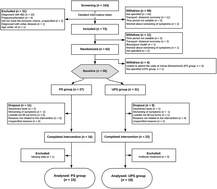当前位置:
X-MOL 学术
›
Food Funct.
›
论文详情
Our official English website, www.x-mol.net, welcomes your feedback! (Note: you will need to create a separate account there.)
Lacto-fermented sauerkraut improves symptoms in IBS patients independent of product pasteurisation – a pilot study†
Food & Function ( IF 6.1 ) Pub Date : 2018-09-03 00:00:00 , DOI: 10.1039/c8fo00968f Elsa Sandberg Nielsen 1, 2, 3 , Eirik Garnås 1, 2, 3 , Kathrine Juul Jensen 1, 2, 3 , Lars Hestbjerg Hansen 3, 4, 5 , Peder Sandvold Olsen 6, 7, 8 , Christian Ritz 2, 3, 9, 10 , Lukasz Krych 1, 2, 3 , Dennis Sandris Nielsen 1, 2, 3
Food & Function ( IF 6.1 ) Pub Date : 2018-09-03 00:00:00 , DOI: 10.1039/c8fo00968f Elsa Sandberg Nielsen 1, 2, 3 , Eirik Garnås 1, 2, 3 , Kathrine Juul Jensen 1, 2, 3 , Lars Hestbjerg Hansen 3, 4, 5 , Peder Sandvold Olsen 6, 7, 8 , Christian Ritz 2, 3, 9, 10 , Lukasz Krych 1, 2, 3 , Dennis Sandris Nielsen 1, 2, 3
Affiliation

|
Lacto-fermented sauerkraut contains a natural variety of lactic acid bacteria (LAB) and has not previously been studied in the treatment of irritable bowel syndrome (IBS) patients. The present study investigated the effect of a daily lacto-fermented sauerkraut supplement in relation to IBS patients’ gastrointestinal symptoms and gut microbiota composition. A randomized double-blinded intervention was conducted with 34 Norwegian IBS patients. The patients were consuming either pasteurized sauerkraut (PS; n = 15) or unpasteurized sauerkraut (UPS; n = 19) as a supplement to their daily diet for 6 weeks. The differences in change of symptoms were assessed using the questionnaire IBS-Symptom Severity Score (IBS-SSS) measured at the baseline, and at weeks 2, 4, 6 and 8 (follow-up). The gut microbiota composition was analysed using 16S rRNA gene amplicon sequencing of faecal samples from the baseline and week 6. The mean change in IBS-SSS was −38.57 ± 17.08 PS vs. −56.99 ± 16.92 UPS and was significantly improved in both groups (P < 0.04), while the improvement in symptoms was not different between the intervention groups. The sauerkraut intervention (pasteurized or not) also led to significant gut microbiota compositional changes as determined by 16S rRNA gene amplicon sequencing (un-weighted UniFrac: P = 0.001, weighted UniFrac: P = 0.001). Sauerkraut related LAB in feces (Lactobacillus plantarum and Lactobacillus brevis) were significantly more often present in the UPS-group. In conclusion lacto-fermented sauerkraut had an effect on IBS patients’ symptoms and gut microbiota even though the study was underpowered. Our results indicate that the observed effect to a larger extent can be attributed to the potential prebiotics in lacto-fermented sauerkraut rather than the viable LAB. Future studies with greater statistical power are needed to clarify the possible effects of LAB from lacto-fermented sauerkraut in the treatment of IBS patients.
中文翻译:

乳发酵酸菜可改善IBS患者的症状,而与产品巴氏杀菌无关-一项初步研究†
乳酸菌发酵的酸菜含有天然乳酸菌(LAB),以前尚未在肠易激综合症(IBS)患者的治疗中进行过研究。本研究调查了每日乳酸发酵酸菜补充剂对IBS患者胃肠道症状和肠道菌群组成的影响。对34名挪威IBS患者进行了随机双盲干预。患者正在食用巴氏杀菌酸菜(PS; n = 15)或未巴氏杀菌酸菜(UPS; n= 19)作为他们6周日常饮食的补充。症状变化的差异使用基线,第2、4、6和8周(随访)的IBS症状严重程度评分表(IBS-SSS)进行评估。使用粪便样品的16S rRNA基因扩增子测序从基线和第6周分析肠道菌群组成。IBS -SSS的平均变化为−38.57±17.08 PS,而−56.99±16.92 UPS,两组均得到明显改善(P <0.04),而干预组之间的症状改善没有差异。酸菜的干预(无论是否经过巴氏杀菌)也导致了肠道菌群的显着变化,这由16S rRNA基因扩增子测序确定(未加权的UniFrac:P= 0.001,加权UniFrac:P = 0.001)。粪便中与酸菜有关的LAB(植物乳杆菌和短乳杆菌)在UPS组中的出现率更高。总之,即使这项研究动力不足,但乳酸菌发酵的酸菜对IBS患者的症状和肠道菌群也有影响。我们的结果表明,观察到的效果在很大程度上可以归因于乳酸菌发酵的酸菜中的潜在益生元,而不是可行的LAB。需要进一步的统计能力的研究来阐明乳酸菌酸菜中LAB在治疗IBS患者中的可能作用。
更新日期:2018-09-03
中文翻译:

乳发酵酸菜可改善IBS患者的症状,而与产品巴氏杀菌无关-一项初步研究†
乳酸菌发酵的酸菜含有天然乳酸菌(LAB),以前尚未在肠易激综合症(IBS)患者的治疗中进行过研究。本研究调查了每日乳酸发酵酸菜补充剂对IBS患者胃肠道症状和肠道菌群组成的影响。对34名挪威IBS患者进行了随机双盲干预。患者正在食用巴氏杀菌酸菜(PS; n = 15)或未巴氏杀菌酸菜(UPS; n= 19)作为他们6周日常饮食的补充。症状变化的差异使用基线,第2、4、6和8周(随访)的IBS症状严重程度评分表(IBS-SSS)进行评估。使用粪便样品的16S rRNA基因扩增子测序从基线和第6周分析肠道菌群组成。IBS -SSS的平均变化为−38.57±17.08 PS,而−56.99±16.92 UPS,两组均得到明显改善(P <0.04),而干预组之间的症状改善没有差异。酸菜的干预(无论是否经过巴氏杀菌)也导致了肠道菌群的显着变化,这由16S rRNA基因扩增子测序确定(未加权的UniFrac:P= 0.001,加权UniFrac:P = 0.001)。粪便中与酸菜有关的LAB(植物乳杆菌和短乳杆菌)在UPS组中的出现率更高。总之,即使这项研究动力不足,但乳酸菌发酵的酸菜对IBS患者的症状和肠道菌群也有影响。我们的结果表明,观察到的效果在很大程度上可以归因于乳酸菌发酵的酸菜中的潜在益生元,而不是可行的LAB。需要进一步的统计能力的研究来阐明乳酸菌酸菜中LAB在治疗IBS患者中的可能作用。


























 京公网安备 11010802027423号
京公网安备 11010802027423号